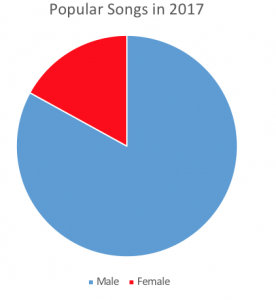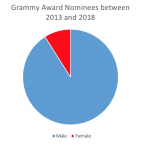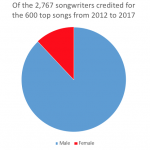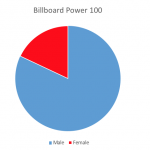While gender diversity is a pervasive problem across almost all industries, a new study has highlighted just how bad of problem this is in the music industry in particular. Here a close examination of music business stats and recent Grammy wins reveals the troubling reality of gender inequality in the music world.
_______________________
Guest post by Megan McGarry from the Berklee College Of Music: Music Business Journal
Gender diversity in the entertainment industry has recently been a heavily discussed topic. As these issues are being brought to light, many are coming to a realization that gender diversity in the music industry is just as problematic, if not worse, than in Hollywood. While women’s difficulties breaking into the music business is no secret, a study from the USC Annenberg School for Communication and Journalism Division showed just how blatant the lack of diversity in today’s music industry is for women.
The Grammys
At the Grammy Awards, for example, the success of stars like Beyoncé, Taylor Swift and Adele may make headlines, but a vast majority of awards go to men. On Sunday, January 28th, 2018, The Recording Academy® presented the 60th Annual GRAMMY Awards®, hosted by James Corden at New York City’s Madison Square Garden. As a collection of musicians, songwriters, producers, engineers, and recording professionals, the Recording Academy is the only peer-presented award to honor artistic achievement, technical proficiency, and overall excellence in the recording industry without regard to album sales or chart position. The primary goal of the organization is “to positively impact the lives of musicians, industry members and our society at large.”
One of the most memorable moments of the 2018 GRAMMY Awards is the message of solidarity from Janelle Monáe as she introduced Kesha’s performance of “Praying:”
“To those who would dare try to silence us, we offer you two words: Time’s Up. We say time’s up for pay and equality; time’s up for discrimination; time’s up for harassment of any kind; and time’s up for the abuse of power.” She continues: “Just as we have the power to shape culture, we also have the power to undo the culture that does not serve us well.”
Calling industry members to action, she petitions for music professions to “work together, women and men, as a united music industry, committed to creating more safe work environments, equal pay, and access for all women.” But regardless of these powerful words, only one female-identifying industry member took home an award this year, Alessia Cara, for Best New Artist. When questioned by Variety about #GrammySoMale, Recording Academy president, Neil Portnow, replied:
“It has to begin with…women who have the creativity in their hearts and souls, who want to be musicians, who want to be engineers, producers, and want to be a part of the industry on the executive level. [They need] to step up because I think they would be welcome. I don’t have personal experience of those kinds of brick walls that you face but I think it’s upon us – us as an industry – to make the welcome mat very obvious, breeding opportunities for all people who want to be creative and pay it forward and creating that next generation of artists.”
Following the 2018 GRAMMY Awards Ceremony and Portnow’s remark that women need to “step up,” the music industry experienced a rippling of conversations on equality and representation. Loudest among these responses is a public letter from a collection of female executives. They call for Portnow’s resignation:
“Dear Mr. Neil Portnow,
The statement you made this week about women in music needing to ‘step up’ was spectacularly wrong and insulting and, at its core, oblivious to the vast body of work created by and with women. Your attempt to backpedal only emphasizes your refusal to recognize us and our achievements. Your most recent remarks do not constitute recognition of women’s achievements, but rather a call for men to take action to “welcome” women. We do not await your welcome into the fraternity. We do not have to sing louder, jump higher or be nicer to prove ourselves. We step up every single day and have been doing so for a long time. The fact that you don’t realize this means it’s time for you to step down. Today we are stepping up and stepping in to demand your resignation.”
The letter is closed with, “Time’s Up, Neil,” but not before including a long list of facts taken from a recent report on Inclusion in Popular Music from USC Annenberg School for Communications and Journalism division.
During the 25th Annual James G. Zafris Jr. Distinguished Lecture Series at Berklee College of Music, Natalia Nastaskin, head of US Music Operations at United Talent Agency and one of the twenty-one female executives to sign the letter to Neil Portnow, briefly commented on the conversation surrounding this year’s Grammy Awards as she spoke to students, the emerging industry professionals. Communicating that “any change takes work,” she advocates that the industry and industry executives need to be “proactive in driving change.”
Portnow issued a statement in response to the public outrage that acknowledged the hurt his word choice caused and pointed a finger at the bigger issues of gender bias and barriers at hand. While he did not apologize for his error, he did make an announcement:
“The Recording Academy is establishing an independent task force to review every aspect of what we do as an organization and identify where we can do more to overcome the explicit barriers and unconscious bias that impede female advancement in the music community.”
On March 6th, the Recording Academy named the new chair for the Inclusion and Diversity Task Force: Tina Tchen. This Chicago-based lawyer has been a leader of legal defense for Time’s Up, an initiative by some of Hollywood’s most powerful women that seeks to tackle sexual harassment inside and outside their industry. In their initial public letter published in Times Magazine on December 21st, 2017, they address “the struggle for women to break in, to rise up in the ranks, and to simply be heard and acknowledged in male-dominated workplaces.” Exclaiming that the “time’s up on this impenetrable monopoly,” the #TIMESUP initiative has become a unified strive for safe and equitable workplaces for women everywhere, from movie sets, to farm fields, to boardrooms.
Members of the music industry are still awaiting a mission statement from the Recording Academy’s Task Force.
Statistics
Recently, the media has been heavily focusing on female misrepresentation statistics at a record rate. Some that have been heavily talked about are that female artists comprise only 7.9% of rosters at North America’s major talent agencies and that women make up 59% of entry-level music business roles in the U.K., but only 30% of senior executive roles. Also, electronic music festival acts in 2015 skewed 82.3% male versus just 10.8% female. Moreover, Beyoncé was Coachella’s first female headliner in a decade.
The report from USC Annenberg School for Communication and Journalism division that was referred to in the public letter to Portnow has found many statistics that bring out the lack of diversity in the todays music industry (see charts).
Going Forward
Today’s successful music companies are also tech companies. This renders the music industry susceptible to similar diversity and bias issues that arise in the technology and venture capital spheres. But regardless, it seems the necessity for better diversity and inclusion in the music industry is fairly urgent, especially in today’s political climate. It also seems likely that we will see a growth in music creators pushing for equality and justice, which will be yet another persuasive force for the music industry to start working towards a more equal environment.




Bibliography
Hu, Cherie. “A Playbook For Pushing The Needle On Diversity In Music.” Forbes, Forbes Magazine, 2 Feb. 2017, www.forbes.com/sites/cheriehu/2017/01/31/a-playbook-for-pushing-the-needle-on-diversity-in-music/#761e6c321b3b.
Lhooq, Michelle. “Numbers Don’t Lie: Sexism in Dance Music Culture in 2014.” Thump, 30 Dec. 2014, thump.vice.com/en_us/article/aeqpwb/numbers-dont-lie-sexism-in-dance-music-culture-in-2014.
Aswad, Jem. “Female Executives Call for Grammy Chief Neil Portnow’s Resignation.” Variety, 2 Feb. 2018, variety.com/2018/biz/news/female-executives-call-for-grammy-chief-neil-portnows-resignation-1202684962/.
Hu, Cherie. “A Look at How the Recording Academy’s Task-Force Assembly Stacks Up.”Billboard, 26 Mar. 2018, www.billboard.com/articles/business/8257534/recording-academy-task-force-music-industry-concerns-legal-experts.
Baker, Lara. “The Challenge Of Organising A Gender-Balanced Conference In The Music Industry.” HuffPost UK, 11 Dec. 2017, www.huffingtonpost.co.uk/lara-baker/gender-balanced-music-industry_b_13555434.html.
Weaver, Hilary. “Beyoncé Makes History Yet Again.” Vanities, Vanity Fair, 3 Jan. 2017, www.vanityfair.com/style/2017/01/beyonce-headlining-coachella-2017.
Ellis-Petersen, Hannah. “Upper Reaches of Music Industry ‘a Man’s World’, Diversity Study Finds.” The Guardian, Guardian News and Media, 9 Jan. 2017, www.theguardian.com/business/2017/jan/09/upper-reaches-of-music-industry-a-mans-world-diversity-study-finds.
“Female:Pressure Report 03.” Female:Pressure, 2015.